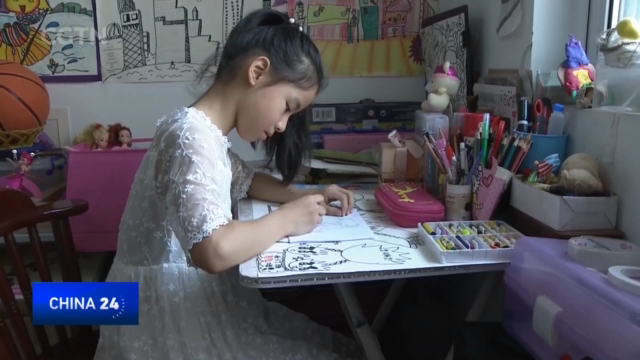
21:39, 23-Aug-2019
New Semester: Children of rural migrant workers look forward to the future
Updated
21:55, 23-Aug-2019

In China's Jiangsu Province, statistics show that more children of rural migrant workers are gaining better access to education – especially in the cities where their parents work. CGTN reporter Zhou Jiaxin takes us to the capital of Jiangsu to find out how one migrant student is preparing for the new semester and her future.
With only one week to go before the fall semester, Gao Qing is getting ready for her fifth year at the Huagang Number 1 Elementary School in Nanjing -- the capital of East China's Jiangsu Province.
More than 70 percent of the school's students are children of rural migrant workers. Qing's parents have been working in Nanjing for the past decade. Five years ago, they decided to move her to the big city, where she could complete her education. This year, Qing chose to spend her summer vacation on extracurricular activities in Nanjing, instead of returning to their hometown of Fuyang in the neighboring Anhui Province.
GAO QING, MIGRANT STUDENT HUAGANG NO. 1 ELEMENTARY SCHOOL "When I came to the city, I felt very happy to be with my parents. The city makes me feel like everything is new."
The National Statistics Bureau shows there were about 288 million rural migrant workers in China in 2018. They are considered major contributors to social mobility and the stable growth of the world's second-largest economy.
GAO XINGMEI MIGRANT PARENT "We are at least happier together, and she can have the same access to educational resources as other children in the city."
In 2018, the enrollment rate among migrant students was nearly 99 percent. Among elementary students, the percentages were at 82.2 in public schools and 11.6 in private schools.
GUO HONGXIA, PRINCIPAL HUAGANG NO. 1 ELEMENTARY SCHOOL "At first, the children who came to our school did feel like they were outsiders and had a weak sense of belonging. We took them out to experience the city and brought them to places they had never been to before. We took them to the Academy of Agricultural Sciences and museums so they could learn more about the city."
ZHOU JIAXIN NANJING, JIANGSU PROVINCE "Back in 1996, the province of Jiangsu made a vow to lead the way in modernizing education in the country. Over the past two decades, the government has set the pace in building a 'Jiangsu model', which is evident in how migrant children in the city are given access to education."
LI HONGTIAN, PRESIDENT JIANGSU EDUCATIONAL MODERNIZATION INSTITUTE "About 1.5 million migrant children are enrolled in schools providing compulsory education in Jiangsu and 87 percent of them study in public schools. They can go to school free of charge in the districts where they live. They have financial support from the government, good teachers, and an opportunity to take the high school entrance exam. This greatly contributes to a more peaceful and content life for generations of migrant families."
GAO QING, MIGRANT STUDENT HUAGANG NO. 1 ELEMENTARY SCHOOL "I hope I will do better in the new semester because I also want to do good in junior high. I have to study hard now so I can achieve my dreams in the future."
No matter what the future holds for Qing, she's surely on a clear path in the present toward the right direction. ZHOU JIAXIN, CGTN, NANJING, JIANGSU PROVINCE.
SITEMAP
Copyright © 2018 CGTN. Beijing ICP prepared NO.16065310-3
Copyright © 2018 CGTN. Beijing ICP prepared NO.16065310-3